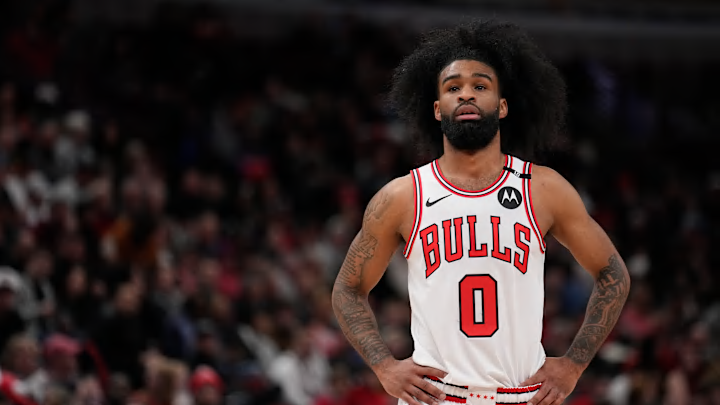There was once a time when a top-five selection in June's draft felt feasible for the Chicago Bulls. Three days prior to the trade deadline, sitting at 10th place in the Eastern Conference, merely five games behind the fifth-place Milwaukee Bucks, the Bulls traded leading scorer Zach LaVine to the Sacramento Kings in a salary-dump move.
Immediately following the trade, the Bulls defeated their much-maligned play-in rival, the Miami Heat, before dropping their next six contests. The losses weren't necessarily pretty either. Chicago's closest call came against the New York Knicks, which ended in a 113-111 overtime loss. Aside from the defeat at the hands of the Knicks, Chicago's average margin of defeat was 20.4 points. Including the Knicks, the Bulls' margin of defeat amid the six-game losing streak was still a woeful 17.3.
Consequently, after losing six consecutive contests, Chicago, the 11th-place Brooklyn Nets, and the 12th-place Philadelphia 76ers were all within two games of one another. It finally seemed the Bulls were embracing a prolonged rebuild by prioritizing draft positioning over the Play-In Tournament.
The Bulls dominated in the latter fourth of the 2024-25 season
Nonetheless, the Bulls reverted to old habits soon thereafter. Chicago defeated the 76ers and 13th-place Toronto Raptors in two of its next three affairs. Thus, to begin March, the Bulls built a two-and-a-half game lead over the 76ers, a three-game lead over the Nets, and a six-game lead over the Raptors.
Unsurprisingly, the Bulls' winning efforts didn't stop there. Chicago went 9-6 in March, capped off by Coby White winning Player of the Month honors, and 6-1 in April to earn the ninth seed for the second consecutive season.
From March 6 onward, Chicago fielded the fourth-best record in the NBA. The Bulls ranked ninth in offensive rating and made significant strides defensively, placing seventh in defensive rating over the final 20 games of the season. For comparison, the Bulls ranked 26th in the NBA from the beginning of the season to March 5.
Yet, it's fair to question the Bulls' late-season surge. For one, did Chicago mean to win 15 of their last 20 contests? And two, were the Bulls opponents on the same page—were they angling for wins or prioritizing draft positioning?
Are you buying the 15-5 finish to last season, Bulls Nation?@treykerby isn't quite convinced, but thinks they earned the right to try it again. pic.twitter.com/Bl7b8Fuyul
— CHGO Bulls (@CHGO_Bulls) August 13, 2025
No Dunks' Trey Kirby certainly isn't moved by the Bulls' success in the final fourth of the season. Joining the CHGO Bulls podcast, Kerby stated, "[The Bulls] were doing good when most of the league was… packing it in, then once they started trying, they were left in the dust," when referencing Chicago's ugly defeat by the Heat in the play-in.
Chicago won plenty of games, but at what cost?
Kerby brought up several compelling realizations, including Matas Buzelis' development, Josh Giddey's stellar play, and the Bulls' general cohesiveness. Yet, the Bulls accomplished this feat while teams were, according to Kerby, "packing it in."
Of Chicago's 15 victories from March 6 onward, over half came against non-playoff teams. The other wins come with an asterisk. For instance, the Bulls defeated the Indiana Pacers without Tyrese Haliburton, the Denver Nuggets without Nikola Jokic, and the 76ers without Joel Embiid, Paul George, and Tyrese Maxey.
Of course, it's not up to the Bulls who's in and who's out. But, as stated above, it's fair to question the Bulls' late-season success story. The only Bulls to miss the latter half of the season were Lonzo Ball, Ayo Dosunmu, and Tre Jones. Chicago was generally healthy and seemingly hellbent on earning a spot in the play-in—zigging while the rest of the bottom-feeders were zagging.
Also, as Kerby pointed out, when the games did matter, Chicago faltered. The Heat demolished the Bulls in the Play-In Tournament before getting ransacked by the Cleveland Cavaliers in the first round of the playoffs. Moreover, the final score between the Bulls and Heat wasn't indicative of how bad a thrashing it really was.
Miami led Chicago by 24 points at halftime behind stellar offensive play. But the Heat's offense wasn't solely responsible, as the Bulls' seemingly improved defense deserves to shoulder much of the blame. Chicago allowed Miami to score 71 points in the first half alone, routinely letting Tyler Herro get to the rim with ease.
If anything, the Bulls' final 20 games ushered in a new era of basketball. While Chicago's 15-5 record shouldn't inspire unwavering confidence heading into the 2025-26 campaign, it solidified the organization's direction moving forward. The Bulls have a fun, young core worth building around under Billy Donovan's guidance.
